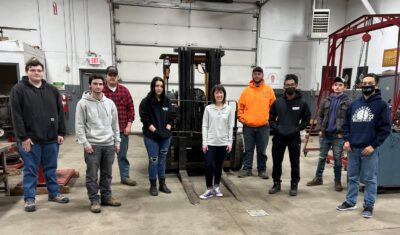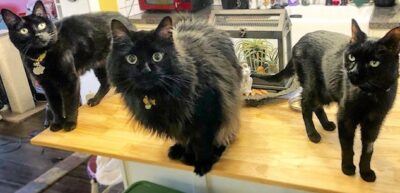Johnson College and Bloomsburg University signed a dual admission transfer agreement on April 27, 2022. Through this agreement, students who apply for dual admission and graduate from Johnson College’s Electronic Engineering Technology program are guaranteed admission to Bloomsburg University. They will enter with at least full junior standing in Bloomsburg University’s Bachelor of Science in Electronics Engineering Technology program.
Johnson College students transferring to Bloomsburg University must meet minimum cumulative grade-point average requirements and satisfy all other transfer requirements. All agreements become effective in Fall 2022.
“Creating a pathway for our students to achieve a bachelor’s degree at Bloomsburg University ensures they continue to build on their Johnson College hands-on education to advance their future careers,” said Dr. Katie Pittelli, President & CEO of Johnson College.
“True to our mission of educating the students of Pennsylvania and beyond, this agreement will ensure that Johnson College students have a seamless transition to Bloomsburg University, creating the best path forward to future success,” said BU President Bashar Hanna.
About Bloomsburg University:
Established in 1839, Bloomsburg University is a comprehensive public institution that enrolls approximately 7,600 students in 57 undergraduate degree programs and 20 graduate programs, including doctorates in both the audiology and nursing practice. Bloomsburg University of Pennsylvania is the fourth largest of the 14 institutions within the Pennsylvania State System of Higher Education (PASSHE). Degrees and programs are offered through the Zeigler College of Business (AACSB-accredited), the College of Liberal Arts, the College of Education (CAEP-accredited), the College of Science and Technology, and the School of Graduate Studies. There are 374 full-time tenured/tenure track faculty, of whom 92 percent have earned terminal degrees. On July 1, 2022, Bloomsburg will officially integrate with Lock Haven, and Mansfield Universities under the name Commonwealth University of Pennsylvania, creating a student-centered, academic powerhouse that will grow opportunities while honoring local campus traditions.
About Johnson College:
Johnson College provides real-world, hands-on learning in a supportive environment and prepares graduates to enter into or advance their careers. Johnson College degrees become essential careers. Johnson College was founded in 1912 and is the region’s only technical college, offering 17 associate degree and 5 academic certificate programs. A low student-to-instructor ratio supports an emphasis on hands-on learning. Located in Scranton on a 44-acre campus, the College is an accredited, private, non-profit, co-educational institution with a strong tradition of working with regional businesses and industries to ensure a skilled and qualified workforce. For additional information on Johnson College, please call 1-800-2-WE-WORK, email enroll@johnson.edu, or visit Johnson.edu.
PHOTO CAPTION:
Johnson College and Bloomsburg University signed a dual admission transfer agreement on April 27, 2022. Through this agreement, students who apply for dual admission and graduate from Johnson College’s Electronic Engineering Technology program are guaranteed admission to Bloomsburg University’s Bachelor of Science in Electronics Engineering Technology program. Pictured left to right: Dr. Latha Ramakrishnan, Dean, College of Science and Technology, Bloomsburg University, Dr. Diana Rogers-Adkinson, Provost and Senior Vice President for Academic Affairs, Bloomsburg University, Dr. Kellyn Williams, Associate Vice President of Special Programs, Johnson College, and Dr. Katie Pittelli, President & CEO, Johnson College.




